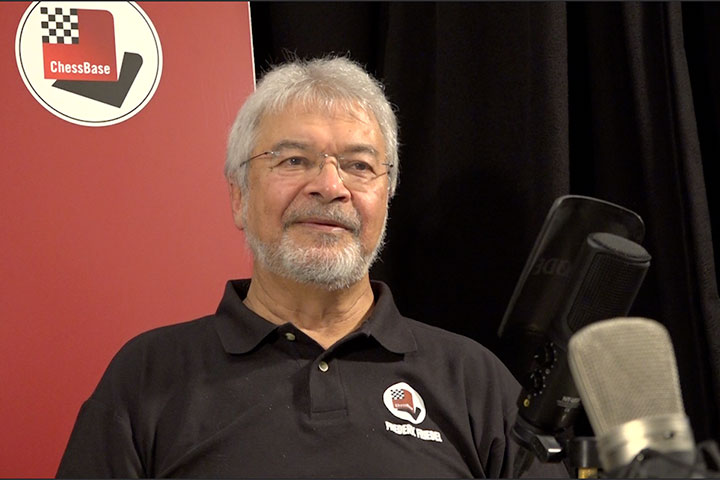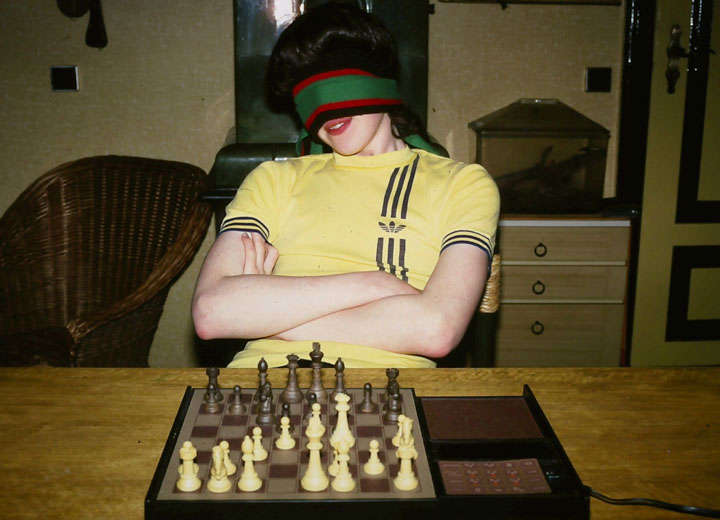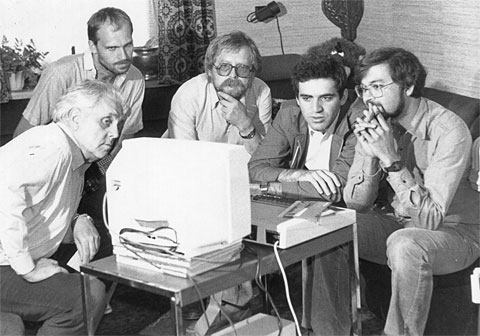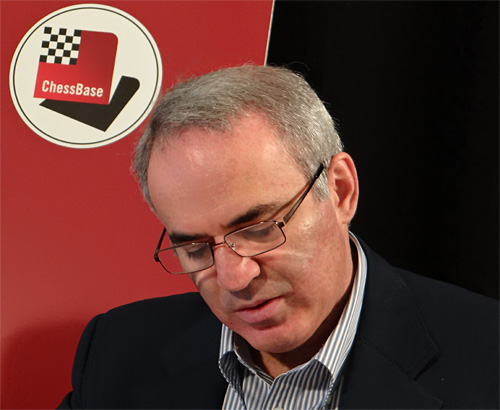


Master Class Vol.7: Garry Kasparov
On this DVD a team of experts gets to the bottom of Kasparov's play. In over 8 hours of video running time the authors Rogozenko, Marin, Reeh and Müller cast light on four important aspects of Kasparov's play: opening, strategy, tactics and endgame.
What does one do after an aborted career as a university professor in Philosophy? In Frederic Friedel's case, becoming a science journalist fit the bill. It was while working on science documentaries for German TV in the late 70s that the idea arose to tell a story about computers and chess. Little did he know that those two fascinations — computers and chess — would become inextricably intertwined in ways that would dictate much of his attention over the next four decades.
Here's Frederic picking up the story of how he came to conduct experiments on a teenage Nigel Short in 1980 for a documentary examining position recognition.
Nigel Short takes us on an electrifying journey through a very rich chess career, which saw him beat no less than twelve world champions. His experience in tournaments and matches all over the world – Short has visited a total of 89 countries – can be seen in the narratives that precede the games which he annotates with humour and instructive insights.
FF: "One day I went to my boss who was a very famous science journalist and said to him, ‘did you know that computers can play chess’, and he said ‘no way’, and I said ‘yeah, they’re playing chess now and pretty good.’ So we decided to make a science documentary on how computers play chess and can play chess at all. And we made a very nice and very successful documentary where [IM] David Levy — who had bet that for ten years no computer would beat him — played against a computer in our studio, with a huge mechanical arm moving the pieces, controlled by a computer in America — in Minneapolis. And it was very successful so the other channel came to me and said let’s do one ourselves, and this time we concentrated on the difference between human thinking and computer thinking, and we needed subjects. So I invited a young boy — a very talented young boy — to come to Hamburg and to play in a tournament which was staged there. And he came, his parents sent him alone without anyone — he was about 14 or just turned 15 — and I remember I arranged that Lufthansa would chaperone him at the airport in Dusseldorf, because when I picked him up I was looking for a little child, but it was a 6 foot tall (almost) strapping young lad — Nigel Short. And this was the first time I got to know Nigel, he came and stayed in my home. We did a lot of filming with him.
He looked very feminine at the time, and he would go to the tournament with a teddy bear and so on and put it on the table, and the Eastern European grandmasters who he was playing this found this very disconcerting. They didn’t know, ‘am I playing a girl or a boy? What’s the teddy bear? Is this a child?’ But of course he was very very strong."
Nigel Short takes us on an electrifying journey through a very rich chess career, which saw him beat no less than twelve world champions. His experience in tournaments and matches all over the world – Short has visited a total of 89 countries – can be seen in the narratives that precede the games which he annotates with humour and instructive insights.

Short, blindfolded against an early chess computer
Later the same year, Frederic had a front row seat as Garry Kasparov scorched the field at the World Junior Championship in Dortmund, winning with a score of 10½ / 13 a point and a half clear of...Nigel Short.

Kasparov was 1½ points ahead of (and a head taller than) Short (at left is bronze winner Iván Morovic) | Photo: Frederic Friedel
Friedel explains:
How to play the Najdorf Vol. 1
A great moment when the world's leading expert shares all the secrets in his favourite opening. The Najdorf system in the Sicilian Defence has a legendary reputation as a defensive weapon for Black. In part one Garry Kasparov introduces the various sub-systems of the Najdorf, including the central “Poisoned Pawn” variation.
FF: "What happened was now I was friends with Nigel and he was playing in the Junior World Championship in Dortmund, so I went to visit him, and by the way I met one of my best friends in chess ever, this is John Nunn — he was Nigel’s second, and so he became also a friend and he also came to visit very often. And I was hanging out on the street outside the tournament hall when I was approached by a young man who came to me and said the famous words, ‘5 to 3, draw you win? 5 dollars a game’. What he was saying is ‘you get 5 minutes, I get 3 minutes, if the game is a draw it means you win, and it’s 5 dollars a game’. He had cleared everyone else out, so I said to him ‘no, no no, I know who you are’ — because he assumed that — I was talking to Nigel or to John and he had no idea who I was so he thought maybe I’m a grandmaster, second or something, helping these two, and since he’d cleaned out everyone else, nobody was playing against him at these conditions, he tried to get me.
Later at the closing dinner I sat down next to him and I chatted with him and he claims he remembers that — I don’t think so because for 5 years we didn’t have any more contact — this was Garry in 1980."
MP: Did you have a sense that you were talking to somebody who was going to go on to do great things in chess?
 FF: "Of course, everyone knew that. And for this reason what happened was that I’d read in a newspaper article that he had given a simul in London and they had given him a computer, which was the famous BBC Acorn Computer. And I had the same computer at home. So what I did was I made a floppy disk — many of our readers will not know what that is — it’s a floppy disk which had data on it...This was the real floppy, and I copied some games on it and I put it in an envelope and I wrote on the envelope “Garry Kasparov, Baku, USSR” — that’s all, I didn’t have his address or anything...
FF: "Of course, everyone knew that. And for this reason what happened was that I’d read in a newspaper article that he had given a simul in London and they had given him a computer, which was the famous BBC Acorn Computer. And I had the same computer at home. So what I did was I made a floppy disk — many of our readers will not know what that is — it’s a floppy disk which had data on it...This was the real floppy, and I copied some games on it and I put it in an envelope and I wrote on the envelope “Garry Kasparov, Baku, USSR” — that’s all, I didn’t have his address or anything...
...A few months later he came to Hamburg to play a practice match against Robert Huebner. He had just had his long match against Karpov which had been interrupted, and the next match was planned for the end of the year, so he came for a practice match against Robert Huebner in Hamburg. And when they asked him ‘what do you want to do on Sunday it’s a free day'?"
How to play the Queen's Gambit
Garry Kasparov took to the Queen’s Gambit at a relatively late stage of his chess career, but then had the best training anyone could imagine: in his first match for the world championship against Anatoly Karpov, this opening appeared on the board no less than 19 times. Now he shares his knowledge with you.
Kasparov told them he wanted to visit Frederic Friedel in Hollenstedt, a suburb of Hamburg. He had never been there before but he just showed up and rang the bell, introduced himself, met Frederic's wife and children and then wanted to talk about computers.
"He came to find out what are computers and what can computers do for chess".
Kasparov wrote about this in his books Child of Change and Deep Thinking.
"I told him what computers can do, and he told me what computers should do for the chess word…he was looking for making [chess] information available for everyone."

Der Spiegel published a headline: Friedel and Kasparov are planning to make a chess database.
"So every crackpot in Germany called and said ‘we have one, or we can do one’ and I actually travelled to a few, but they just wanted access to Kasparov.

So I didn’t know what to do — I’m not a programmer. And the one day, a young man approached me and said, ‘you’re mister Friedel, you want to create a database, here’s a disk’ — this was a small floppy disk, but one of the hard kind — and he handed it over to me and he turned around and walked away. It had his address. I took it home and stuck it into my Atari, and it was a rudimentary chess database, which means you had lots of games, and you could load them, and you could replay them, and you could replay the moves backwards and so on.
And this was Matthias Wullenweber, a physics student. And then at some stage, I said at some stage I said and I called him and said, this is very very interesting, would you be able to come to Zürich [it was actually Basel -Ed.] and show it to someone."
He wanted to show it to Kasparov. Frederic invited Matthias to visit with Kasparov while he was playing a match against Tony Miles. After one of the games Kasparov was tired and uninterested in meeting anyone new, but Frederic dragged him to his hotel room and Matthias showed him the database.
"And then suddenly he threw himself back on the bed and lay there with closed eyes. And Matthias looked at me [as if to say] ‘we’re boarding him, he thinks this is just too stupid.’ And then a minute later Garry jumped up and said, ‘this is the most important development in chess study, since the invention of printing.’ This was like Armstrong landing on the moon — he had to find the right words, so he was thinking about them."
Frederic and Matthias founded ChessBase after Kasparov’s encouragement, and the new World Champion went on to advise and tout the development of the program, starting with ChessBase 1.0 in 1986. The program dramatically shortened the preparation time needed for Kasparov's events. An early demonstration was his use of the first version it to prepare for a match against the German national team. He had lost a similar match a year earlier, but this time ran the table winning 6½-1½.
Select a game from the game list to switch games
How I became World Champion Vol.1 1973-1985
Garry Kasparov's rise to the top was meteoric and at his very first attempt he managed to become World Champion, the youngest of all time. In over six hours of video, he gives a first hand account of crucial events from recent chess history, you can improve your chess understanding and enjoy explanations and comments from a unique and outstanding personality on and off the chess board.
As a result of this collaboration, Kasparov promoted and endorsed ChessBase for free for ten years. He also recorded five video series.

Kasparov in the ChessBase Studio in 2012
The full 75-minute conversation is available via Perpetual Chess: